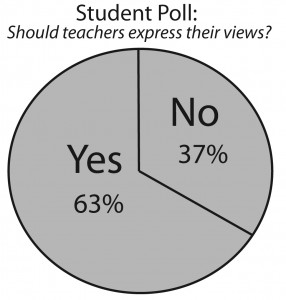 In civics classes, explaining different sides of political issues seems to be a key point in educating students and letting them decide what they think is right, but should teachers express their own views in their classes?
In civics classes, explaining different sides of political issues seems to be a key point in educating students and letting them decide what they think is right, but should teachers express their own views in their classes?
“As long as I can explain why I am pro-choice and why someone else may not be, I think that that’s okay,” social studies teacher Skip Thibault said.
Thibault says he sometimes expresses his opinions in class, but not always. He says he used to be really nervous about it and did not want to tell people how he felt. Thibault changed his mind and started saying certain views after he realized students wanted to know his opinion.
“I think it’s pretty important for us to be able to tell both sides of the story, and let kids make up their own mind,” Thibault said.
Some students may have had teachers express opinions, but junior Jeremiah Hartsock, said he has had classes where they talk politics, but never had teachers express their own views.
Hartsock feels teachers should continue to not express their beliefs “in order to stay neutral and not cause any problems.”
Civics teacher Joseph Kiertekles says he tries to present both sides of issues and then lets the students decide their views, but if a student asks his opinion, he will present his side.
“That is why this country is a democracy; because we are allowed to agree to disagree,” Kiertekles said.
Junior James Calhoun feels that teachers should not share their views in high school because students are still deciding what they want to believe.
“Teachers have the ability to make an imprint on students at a high school level,” Calhoun said.
While some students may think that teachers should not express views, civics teacher Roddy Story said he had college professors who have had opposite opinions. One professor thought in order to let students make up their minds, teachers must remain neutral, while the other thought in order to strengthen students’ current beliefs, it is necessary for the teacher to let students know up front where they stand on their views.
Story personally tries not to express his beliefs in class, but sometimes he does.
“For example: spending. There are some people who are concerned about our government spending,” Story said. “I am so positive that we need to get spending under control, that would be something where I would express my views.”
Although Story may express certain opinions, he always makes sure to explain the other side of the issue. On controversial topics, Story tries not to make his opinion known.
“On stuff where it’s really opinionated, really hot-button, wedge issues, I try not to put my opinion on that,” Story said.
While Story personally expresses some views in class, he believes it is important to explain different sides.
“I think explaining points of view is good, but preaching points of view is not,” Story said.
Along with Story, Thibault thinks it is okay for teachers to explain their views.
Thibault said, “As long as you are not, as a teacher, putting somebody down because they don’t agree with you [it is okay].”
“I think explaining points of view is good, but preaching points of view is not,” Story said.
Along with Story, Thibault thinks it is okay for teachers to explain their views.
Thibault said, “As long as you are not, as a teacher, putting somebody down because they don’t agree with you [it is okay].”
–By Tyler White
